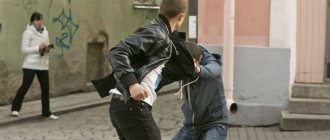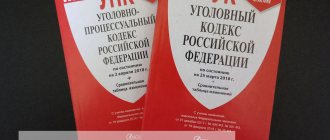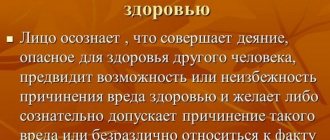1. Intentional infliction of moderate harm to health, not dangerous to human life and not entailing the consequences specified in Article 111 of this Code, but causing long-term health disorder or significant permanent loss of general working capacity of less than one third, -
shall be punishable by restriction of freedom for a term of up to three years, or forced labor for a term of up to three years, or arrest for a term of up to six months, or imprisonment for a term of up to three years.
2. The same act committed:
a) in relation to two or more persons;
b) in relation to a person or his relatives in connection with the performance of official activities by this person or the performance of public duty;
c) in relation to a minor or another person who is known to be in a helpless state by the perpetrator, as well as with special cruelty, humiliation or torture for the victim;
d) by a group of persons, a group of persons by prior conspiracy or an organized group;
e) for hooligan reasons;
f) for reasons of political, ideological, racial, national or religious hatred or enmity, or for reasons of hatred or enmity towards any social group;
g) no longer valid
h) with the use of weapons or objects used as weapons -
is punishable by imprisonment for a term of up to five years.
The task of a lawyer under Article 111
A criminal lawyer who has taken on a case brought under Article 111 of the Criminal Code, Part 2, Part 3-4 must help his client identify violations in examinations and investigative errors in order to quash the charge. If there is no possibility of acquittal, the lawyer must do everything to soften the court’s decision or achieve the application of other articles of the Criminal Code of the Russian Federation to the client.
Causing harm to health - intentional or unintentional - is always serious. Since your most valuable asset—several years of your life—is at stake, it is worth seeking out a qualified and experienced attorney with the knowledge and skills to handle such proceedings.
Only an informed specialist can achieve a positive result and study the issue from all sides. To do this, he must receive answers to the following questions:
- What accompanied the actions of the accused, were they intentional?
- Does the defendant admit to what he did, and how does he feel about his action?
- Does the defendant realize the depth of his act?
- How severe were the injuries suffered by the victim?
Commentary to Art. 112 of the Criminal Code of the Russian Federation
1. The object of this crime is social relations that guarantee the inviolability of health.
2. The objective side includes three signs: the act, the consequences in the form of harm to the health of the victim, as well as the causal relationship between the act and the consequences that occurred.
Medical criteria for signs related to causing moderate harm to health are:
1) temporary dysfunction of organs and (or) systems (temporary disability) lasting more than three weeks (more than 21 days);
2) significant persistent loss of general ability to work by less than 1/3 - persistent loss of general ability to work from 10 to 30% inclusive.
In addition, the mandatory criminal law signs of intentional infliction of moderate harm to health are:
1) absence of harm to health that is life-threatening;
2) absence of consequences specified in Part 1 of Art. 111 of the Criminal Code of the Russian Federation.
3. The subjective side of this crime provides for direct or indirect intent to cause consequences in the form of causing harm to health of moderate severity.
4. The subject of the crime is a sane individual who has reached the age of 14 at the time the crime was committed (Part 2 of Article 20 of the Criminal Code of the Russian Federation).
5. The qualifying features in Part 2 of the commented article practically coincide with the qualifying features in Parts 2 and 3 of Art. 111 of the Criminal Code of the Russian Federation.
Why is it necessary to contact a lawyer?
Unlike the public defender, who has neither interest nor incentive, I, for my part, guarantee full legal support. This means that I:
- I apply to the commission, if necessary - appeal, cassation;
- I provide qualified consultations;
- I interact with government agencies;
- I accompany you during the trial and pre-trial process;
- developing a defense strategy - a promising and adequate action plan;
- collecting evidence;
- in case of newly discovered circumstances, I accompany during the review of the case;
- I am forming a comprehensive protection system.
The outcome of a case brought under Article 111 of the Criminal Code of the Russian Federation can be sadly predictable if you do not receive the support of a lawyer. It is best to contact me for help at the stage of forming a case. The sooner you do this, the better result I can guarantee you.
Submit your application
Thank you!
Your application is accepted. We will contact you shortly.
Error sending application. Try sending again.
Prices for services
- Oral legal advice from a criminal lawyer from 1000 rub.
Analysis of documents from criminal proceedings
from 1000 rub.
Written legal advice from a criminal lawyer with the preparation of an advisory report
from 2000 rub.
Drawing up a lawyer’s request for information and documents
from 2000 rub.
Participation in one investigative action (interrogation, confrontation, etc.)
from 2000 rub.
Participation of a criminal lawyer in one court hearing
from 3000 rub.
Representation of a criminal lawyer in other authorities in the interests of the client
from 2000 rub.
Full management of a criminal case at the stage of inquiry and preliminary investigation
from 10,000 rub.
Full criminal case management in court
from 10,000 rub.
Urgent departure of a criminal lawyer when a client is detained, to a pre-trial detention center, the prosecutor's office, or the Investigative Committee.
from 12,000 rub.
Criminal proceedings
from 30,000 rub.
Recovery of moral damages under UD
from 30,000 rub.
Compensation of expenses by court decision
from 30,000 rub.
Participation of a defense attorney and detective in the preliminary investigation
from 20,000 rub.
Representation of a lawyer in court with charges under articles of medium and grave bodily harm
50 - 90 thousand rubles.
Visit of a lawyer to the investigator, familiarization with the criminal case
from 5000 rub.
Participation of a criminal lawyer in the court of first instance
30,000 - 80,000 rub.
Protection at the stage of investigation, inquiry (especially serious crimes)
90 - 150 thousand rubles.
A lawyer’s visit to a client in custody, development of a line of defense
from 15,000 rub.
Prices for the preparation of procedural documents
rub.
Preparation of a statement of claim
from 2000 rubles.
Preparation of an objection to a statement of claim
from 2000 rubles.
Preparation of applications
from 2000 rubles.
Appeal
from 2000 rubles.
Cassation appeal
from 2000 rubles.
Supervisory complaint
from 2000 rub.
Complaint to the prosecutor's office about illegal actions
from 2000 rubles.
Prices for primary legal assistance in criminal cases
rub.
Legal assistance and defense for a detainee, suspect or accused in the city of Ufa
from 10,000 rubles.
Legal assistance and defense for a detainee, suspect or accused on the territory of the Republic of Bashkortostan
from 15,000 rubles.
Assistance for the victim in case of refusal to initiate a criminal case
from 12,000 rubles.
Participation of a criminal lawyer in the preliminary investigation of a criminal case for a suspect in a crime
rub.
— light weight
from 10,000 rubles.
- medium weight
from 15,000 rubles.
- serious crimes
from 20,000 rubles.
- for especially serious crimes
from 25,000 rubles.
Sentence reclassified from Part 1 of Article 111 to Part 1 of Article 118 of the Criminal Code of the Russian Federation
Every year, investigative authorities initiate and send to the courts tens, if not hundreds, of thousands of cases related to harm to health. Such cases (Articles 111, 112, 115 of the Criminal Code of the Russian Federation) are perhaps among the most common in the general array of criminal statistics.
In such cases, as well as in other criminal cases, a number of circumstances are subject to clarification, which are important to take into account when qualifying the actions of the perpetrator and, depending on the presence or absence of which, the act will be punished under a different rule of law, or will not be punished at all. So, for example, in addition to Article 111, the Criminal Code of the Russian Federation has other “special” norms related to the infliction of grievous harm to health: Art. 113, 114, 118, clause “c”, part 4 of article 162, clause “c” of part 3 of article 163, 264 of the Criminal Code of the Russian Federation, etc.
Thus, despite the fact that all of the above provisions of the law are united by causing consequences in the form of grievous harm to the health of the victim, they are all divided into different articles, chapters and sections of the Special Part of the Criminal Code of the Russian Federation. All of the above crimes, despite the similarity of the criminal result, differ in other elements: the method of committing the act, the direction of the criminal intentions of the perpetrator, his motives, the goals of the criminal actions, etc. Accordingly, the punishment specified in the sanction of a specific article of the Criminal Code of the Russian Federation depends on all of the above, as well as on other specific circumstances. Thus, the perpetrator under Part 1 of Article 111 of the Criminal Code of the Russian Federation may be sentenced to 8 years in prison, while, for example, the sanction of Part 1 of Article 118 of the Criminal Code of the Russian Federation (causing grievous harm to health through negligence) does not provide for imprisonment at all. In this regard, the question of particular relevance is: how to reclassify Article 111 of the Criminal Code of the Russian Federation to Article 118 of the Criminal Code of the Russian Federation or another article with a less severe punishment.
Despite the obvious external differences in acts associated with causing grievous harm to human health, in practice there are often cases of errors in the qualification of acts that occur not only during the investigation, but also in the courts. And if we take into account that in “borderline” situations, investigators, as a rule, qualify the actions of the accused under the article providing for the most severe punishment, then the delimitation of Article 111 of the Criminal Code of the Russian Federation from more privileged elements of the crime requires serious work by the defense to defend their legal rights to all stages of criminal proceedings - from the moment of its initiation until the pronouncement of a verdict that suits the defense.
As an example, we can cite the case against Kramarenko Yu.V. (surname changed - author's note), in respect of whom the verdict of the court of first instance was held under Part 1 of Article 111 of the Criminal Code of the Russian Federation.
The circumstances of the case are not exceptional and are quite banal: Kramarenko Yu.V. got into an argument with an acquaintance and punched him twice in the face. The victim fell from the blow, hit his head and lost consciousness. A forensic medical examination determined that he suffered serious harm to health caused by blunt head trauma resulting from hitting his head on the road surface. The victim was immediately taken to the hospital and received the necessary medical assistance. As part of the immediately initiated criminal case, the suspect was immediately taken into custody. The investigator qualified the actions of the accused under Part 1 of Article 111 of the Criminal Code of the Russian Federation, and rejected all statements and petitions of the lawyer and his client to reclassify the actions of the accused from Part 1 of Article 111 of the Criminal Code of the Russian Federation to Part 1 of Article 118 of the Criminal Code of the Russian Federation. The judge who considered the case acted in a similar manner, who found the defendant guilty of committing the act provided for in Part 1 of Article 111 of the Criminal Code of the Russian Federation and sentenced him to 3 years in prison.
In the appeal, in the court of second instance, in the judicial investigation and debate, the defense managed to substantiate and prove that the intent of Kramarenko Yu.V. was not aimed at causing grievous harm to the victim’s health, and the victim’s head injury, which directly caused grievous harm to his health, was an unexpected consequence of his actions for the accused, which he had no opportunity to foresee. For this purpose, a number of experts and witnesses were questioned in the case, and the attention of the judicial panel was drawn to a number of circumstances that the court of first instance did not take into account.
Ultimately, the appellate court agreed with the defense’s arguments about the need to reclassify the defendant’s actions from Part 1 of Article 111 of the Criminal Code of the Russian Federation to Part 1 of Article 118 of the Criminal Code of the Russian Federation and issued a new sentence against Yu.V. Kramarenko. The appeal verdict of the actions of Kramarenko Yu.V. were reclassified from Part 1 of Article 111 of the Criminal Code of the Russian Federation to Part 1 of Article 118 of the Criminal Code of the Russian Federation, that is, for careless infliction of grievous bodily harm. The convict was sentenced to restriction of freedom, which he had already served while in custody before the appeal verdict in the case.
Court verdict with reclassification of Part 1 of Article 111 of the Criminal Code of the Russian Federation to Part 1 of Article 118 of the Criminal Code of the Russian Federation (extracts):
- Share on facebook
Added 08/22/2016 | Litigation practice, Criminal cases
Submit your application
Thank you!
Your application is accepted. We will contact you shortly.
Error sending application. Try sending again.
Certificates, petitions, statements of claim
| Claim for compensation for damages from a crime | [32 Kb] |
| Appeal against a court decision | [28.5 Kb] |
| Request to question witnesses | [34.5 Kb] |
| Application for admission of a defense lawyer | [37 Kb] |
| Petition to order a forensic medical examination | [31.5 Kb] |
| Petition to terminate the criminal case due to the insanity of the suspect | [31 Kb] |
| Petition to terminate the criminal case | [51.5 Kb] |
| Request for the inclusion of evidence and questioning of a specialist | [49 Kb] |
| Petition to request telephone connection data | [30.5 Kb] |
| Petition for the release of a detainee | [33 Kb] |
| Petition to change the preventive measure | [44 Kb] |
| On the participation of a criminal lawyer in investigative actions | [66 Kb] |
| Request for familiarization with documents of the criminal case | [40.5 Kb] |
| Petition to reclassify the actions of the accused and terminate the criminal case | [55 Kb] |
| Cassation appeal in a criminal case | [37.5 Kb] |
expand







